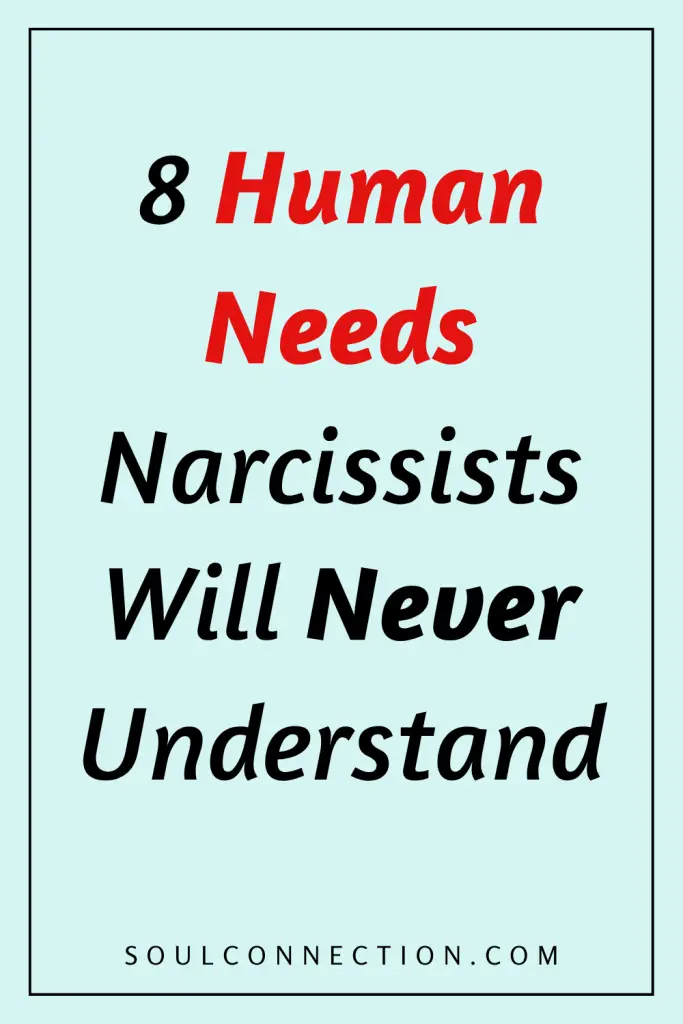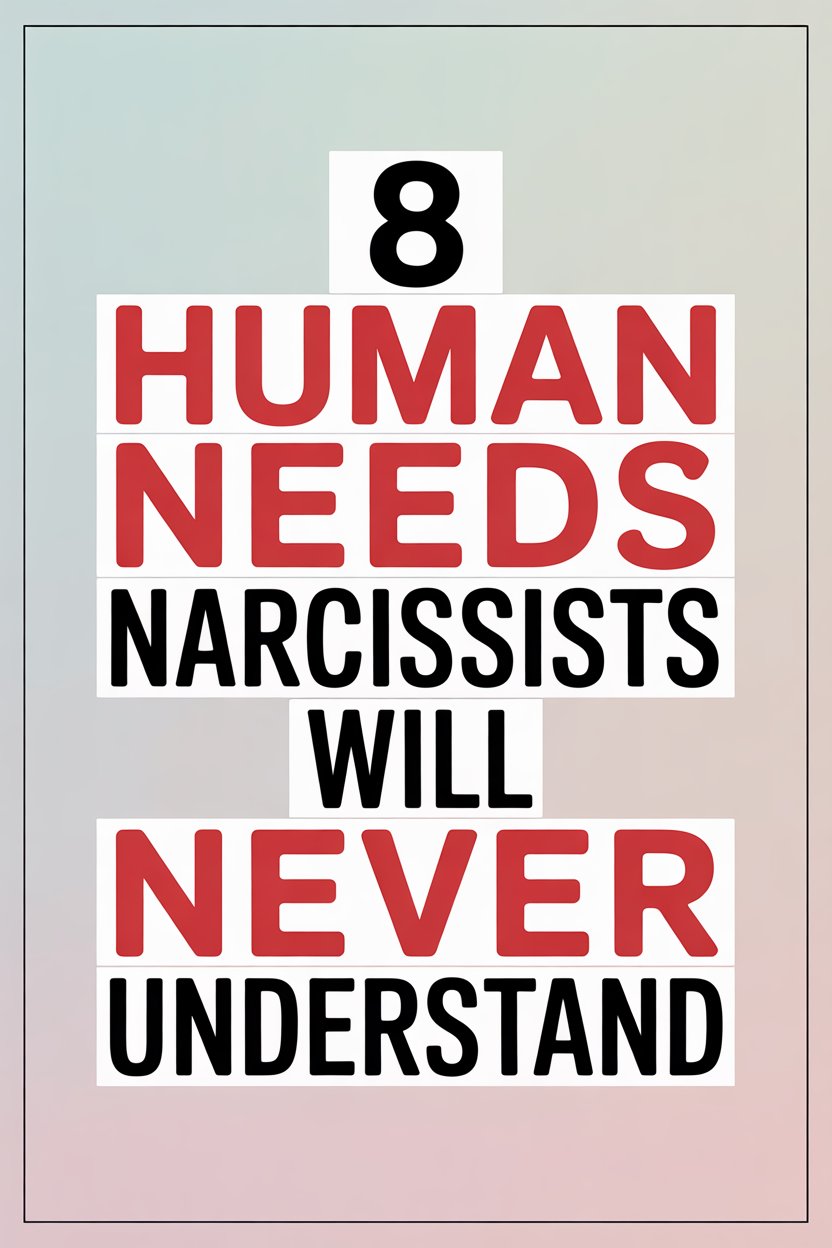Ever tried explaining empathy to a brick wall? That’s essentially what it feels like trying to talk basic human needs with a narcissist.
While the rest of us are out here muddling through life needing love, understanding, and the occasional cup of actual coffee (not that stuff from the office kitchen), those high on the narcissism scale seem to operate on an entirely different emotional currency.
So, what are the basic things that just never seem to click for the narcissist in your life? Buckle up, because here are eight wild concepts that might as well be quantum physics to them.
1. Genuine Empathy
Empathy: the radical idea of noticing other people’s feelings. Narcissists treat this one like gluten at a carb lovers’ convention.
A friend is quietly struggling? The narcissist spots a grand opportunity—to make it about themselves. Tears at a movie? They’ll wonder why you’re “ruining the vibe.” Even when they try to feign concern, it’s all about public optics.
If you’re waiting for a narcissist to sense your pain and offer comfort, you might as well wait for pigs to pilot commercial flights.
What’s the workaround? Rely on friends and family who actually get you. Keep expectations for empathy from your narcissistic acquaintance at “room temperature soup” levels: technically present, but deeply unsatisfying.
2. Unconditional Love
Healthy love says, “I care about you even when you’re having a weird hair day.” Narcissists hand out affection like those sample ladies at the supermarket: only when it benefits them, and only in tiny, unsatisfying doses.
Any relationship with a narcissist is transactional by default. Their “love” is conditional—performance based, strings attached, and always subject to sudden recall without notice.
If you stop serving their needs, affection dries up faster than a puddle on a summer sidewalk.
Protect your heart by recognizing this pattern. Seek relationships where love doesn’t come with an invoice slipped under your door.
3. Sincere Apologies
For most people, apologies are like mental floss—awkward but necessary for keeping things healthy. Narcissists, meanwhile, see apologies as an existential threat.
When presented with their mistakes, expect an Olympic-level display of blame shifting, denial, or the classic “I’m sorry you feel that way.” Actual remorse? Not on the menu.
Accepting responsibility would mean admitting imperfection, which clashes violently with their carefully curated self-image.
If you’re hoping for genuine contrition, it might be time to practice the ancient art of disappointment management. Sometimes, the only closure you’ll get is the one you give yourself.
4. Mutual Respect
Everyone wants to feel respected—unless you’re a narcissist, in which case you’d prefer a one-way street called Admiration Avenue.
Healthy relationships thrive on a give-and-take of respect, valuing each other’s ideas, boundaries, and quirks. Narcissists skip all that and jump straight to demanding deference while steamrolling over your needs.
Your boundaries are viewed as a personal affront, or worse, an inconvenience.
Drawing clear lines is crucial. Be prepared to repeat yourself—firmly—since narcissists are notorious for treating boundaries like speed bumps: minor obstacles, easily ignored.
5. Emotional Safety
For most, a safe relationship means being able to say, “I’m scared,” or “I made a mistake,” without immediately regretting it. Narcissists, though, see vulnerability as a target or a tool—never as a bridge to intimacy.
Sharing your feelings with a narcissist is a bit like hand-feeding a seagull: you’ll lose your sandwich and get pecked in return. Honest emotions may be mocked, weaponized, or dismissed outright.
Safe emotional spaces simply don’t exist in their world, unless it’s their own emotional safety on the line.
If you’re feeling exposed or judged, it’s not you—it’s the environment. Prioritize connections where your inner world is treated with care rather than suspicion.
6. Genuine Appreciation
A heartfelt “thank you” can brighten anyone’s day—unless you’re dealing with a narcissist, who sees appreciation as a sign of weakness or, at best, an afterthought.
They expect praise as their birthright and see your efforts as the background music to their starring role. Don’t hold your breath waiting for acknowledgment; you might faint, and then they’d just complain you’re being dramatic.
What to do? Surround yourself with people who notice and celebrate the small things. Celebrate your own wins, even if you’re your own parade.
7. Healthy Intimacy
Real intimacy is about sharing flaws, dreams, and the embarrassing story about your first crush. Narcissists, on the other hand, prefer the “museum tour” version of intimacy—polished, distant, and heavily guarded.
Getting close to a narcissist feels like hugging a suit of armor: shiny, but cold and unyielding. They’ll avoid genuine closeness, fearing exposure of their own vulnerabilities.
Instead, they opt for superficial connections or scripted affection, never letting anyone see behind the curtain.
You deserve intimacy that feels warm, safe, and mutual. If you find yourself performing rather than connecting, consider stepping back and saving your energy for someone who’s not emotionally Teflon-coated.
8. Belonging Without Strings
Everyone wants to fit in somewhere—messy bits, quirks, bad hair days and all. For narcissists, belonging is purely transactional: “Stick around, but only as long as you make me look good, feel good, or do what I want.”
Rather than creating a sense of community, they foster an unstable climate where you’re constantly auditioning for acceptance. It’s exhausting. One day you’re in, the next day you’re out, Heidi Klum style.
Long-lasting relationships are built on acceptance and security. Gravitate toward those who offer you a seat at the table even when you spill your drink.
You’re not too much, too little, or too weird for the right people.
Finding What Narcissists Miss
No one deserves to have their basic needs treated like optional extras.
If you’ve been wondering why your needs always seem to bounce off a brick wall in your relationships, now you know: narcissists just aren’t wired to get it. Their emotional toolkit consists mainly of a mirror and a megaphone.
Don’t shrink yourself to fit their mold. Instead, seek out connections that offer empathy, real respect, and genuine belonging.
Consider it the ultimate act of self-care—because life’s too short to keep explaining humanity to someone who left their soul at home.
Ready for something better? Your tribe is out there, and they know what a real apology sounds like.


